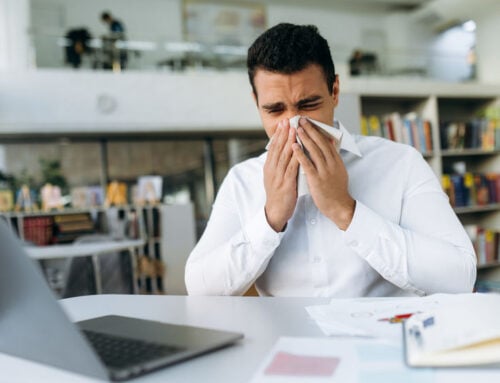What Is The Tympanic Membrane?
A ruptured eardrum is a tear along the tympanic membrane located inside the ear. The medical name for a ruptured eardrum is a tympanic membrane perforation. The tympanic membrane is made of connective tissue that divides the ear canal and the middle ear. This membrane transfers vibrations created by soundwaves to the middle ear enabling people to hear. Therefore, hearing loss is a major sign of a ruptured eardrum.

What are the signs of a ruptured eardrum?
In addition to hearing loss, a few other symptoms point to a ruptured eardrum. Patients with a ruptured eardrum can experience some of these symptoms simultaneously. These symptoms include:
- Tinnitus: ringing in the ears
- Bloody otorrhea: ear discharge
- Vertigo: feelings of spinning or dizziness
- Hearing loss
- Otalgia: ear pain
To diagnose a patient with a ruptured eardrum, doctors must perform a physical exam that includes an otoscopy to view the inner, outer, and middle ear. Using the otoscope, doctors can see the ear’s structure and any complications.
Will an ear infection lead to a ruptured eardrum?
One of the most common ear infections, otitis media, can lead to a ruptured eardrum. Otitis media is an infection of the middle ear. This infection occurs when the eustachian tube that links the middle ear to the throat stops working correctly. The tube stops draining fluid, and the fluid builds up in the ear. Bacteria can also get trapped in the ear and produce an acute infection.
Can earwax removal create a ruptured eardrum?
Removing earwax with a q-tip or bobby pin can puncture the tympanic membrane and rupture the eardrum. These objects can get lodged deep inside the ear and tear the membrane. These items can also transfer bacteria to the ear. Doctors caution patients against using these items to clean the ears.
Will loud noises rupture the eardrum?
Loud noises can create ruptured eardrums, known as acoustic trauma. The loud noise created by a large explosion or loud music negatively impacts the ears and contributes to hearing loss. Frequently, patients experience tinnitus for hours or days after acoustic trauma. Musicians and people working in construction are more susceptible to hearing loss due to the constant presence of loud noises.
Should I go to a doctor?
Patients experiencing any symptoms related to a ruptured eardrum should seek medical attention immediately. Only a medical professional can diagnose a patient and provide the proper treatment. Speak to a physician as soon as possible to learn more about ruptured eardrums.



